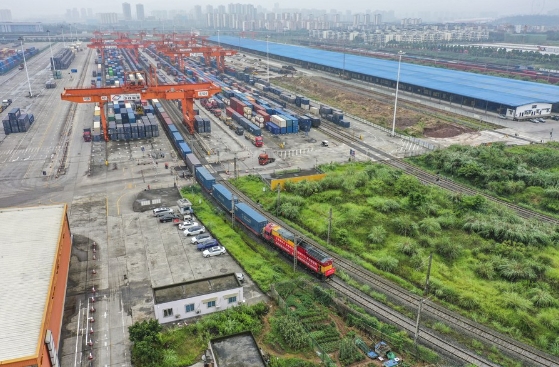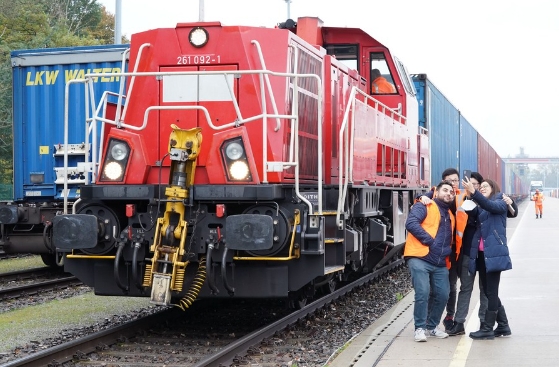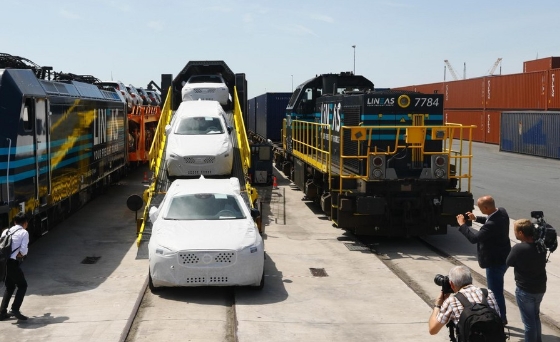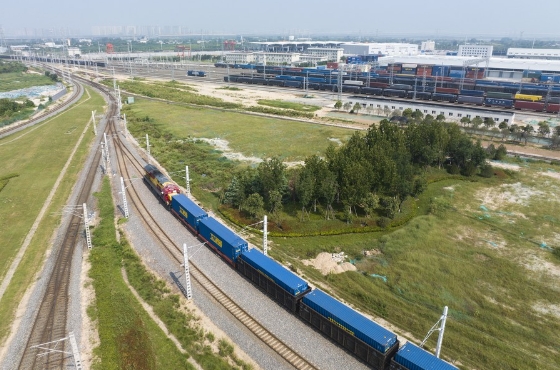European logistics company expands business thanks to China-Europe Express Rail

Aerial photo taken on June 23, 2022 shows a cargo train, which marks the 10,000th trip made by China-Europe freight trains operated by the China-Europe Railway Express (Chongqing), leaving Tuanjie Village Central Railway Station in Chongqing, southwest China.(Xinhua/Huang Wei)
The China-Europe Express Rail allows cargo to be delivered from China to Europe within 14 days, a fast transportation solution costing slightly more than sea freight, but significantly less than air freight.
Metrans, a major player in seaport container traffic in Europe, has expanded its rail services linking the growing markets of Asia and Europe, thanks to rapid cargo transport connections from the China-Europe Express Rail project.
Martin Koubek, director of Silk Road and the CIS division of Metrans, made the remarks in a recent interview with Xinhua at its Dunajska Streda hub, not far from the Slovak capital Bratislava. Situated in the so-called European "golden triangle," the city is strategically connected to Vienna and Budapest and Bratislava.
The company, established in 1991 in Prague, now belongs to the Hamburger Hafen und Logistik AG (HHLA) group based in Hamburg, Germany.

Staff members pose for photos with the first "Shanghai Express" in Hamburg, Germany, on Oct. 26, 2021. (Xinhua/Wang Qing)
Speaking about their CEO's decision to explore the business potential of this express China rail link, Koubek noted that "the origin of the cargo going to Europe" through the seaports is mainly from China, a phenomenon they have observed "for 32 years."
According to Koubek, spare parts for cars is "the best example" of the type of cargo transported from China to Europe. "We can see it in the ports, we can see it on our trains," he added.
The China-Europe Express Rail allows cargo to be delivered from China to Europe within 14 days, a fast transportation solution costing only slightly more than sea freight, but significantly lower than air freight.

Chinese-made Volvo XC60 vehicles exported to Europe via China Railway Express (Chang'an) are seen at the Port of Ghent in Belgium on July 4, 2019. (Xinhua/Zheng Huansong)
Metrans possesses 20 container terminals across Europe, with two more under construction. They operate some 650 trains per week and delivered 1.3 million twenty-foot equivalent units (TEU) last year.
Metrans launched its first China-Europe train service in 2017, delivering goods from central China's Zhengzhou city to Hamburg. This busy connection is still in service today. Later, it launched connections from eastern China's Yiwu city to Prague. Currently, its most frequent service is from western China's Xi'an city to locations in Czechia, Slovakia and Austria.
"We see the significant importance of cargo going from China by rail, that is why we bought the terminal in Malaszewicze, Poland in January 2022, which is very much connected to the Silk Road and we started to boost the connection to China via Malaszewicze," he said.
In another development, cargo going to Hungary from China continues to develop and will be much stronger due to large amounts of investment from Chinese companies in Hungary, Koubek said.

This aerial photo taken on Sept. 7, 2023 shows a Chang'an China-Europe freight train departing from Xi'an International Port in Xi'an, northwest China's Shaanxi Province.(Xinhua/Shao Rui)
From Dunajska Streda, located a few kilometers from the northern Hungarian border, Metrans' network is connected to southeast Europe, home to several European countries which will soon be developed further. Moreover, two new Metrans terminals are under construction, namely in Zalaegersteg and Szeged, located near the western and southern borders of Hungary. They are expected to be opened in 2026.
"Our long-term goal is to make our network on the Silk Road more stable and reliable for the clients," Koubek said.
The Metrans' official is also planning a trip to China in June this year to attend a logistics meeting in Shanghai and to meet with the company's Chinese partners and clients about possible developments in the future.
Editor:伏娅敏
